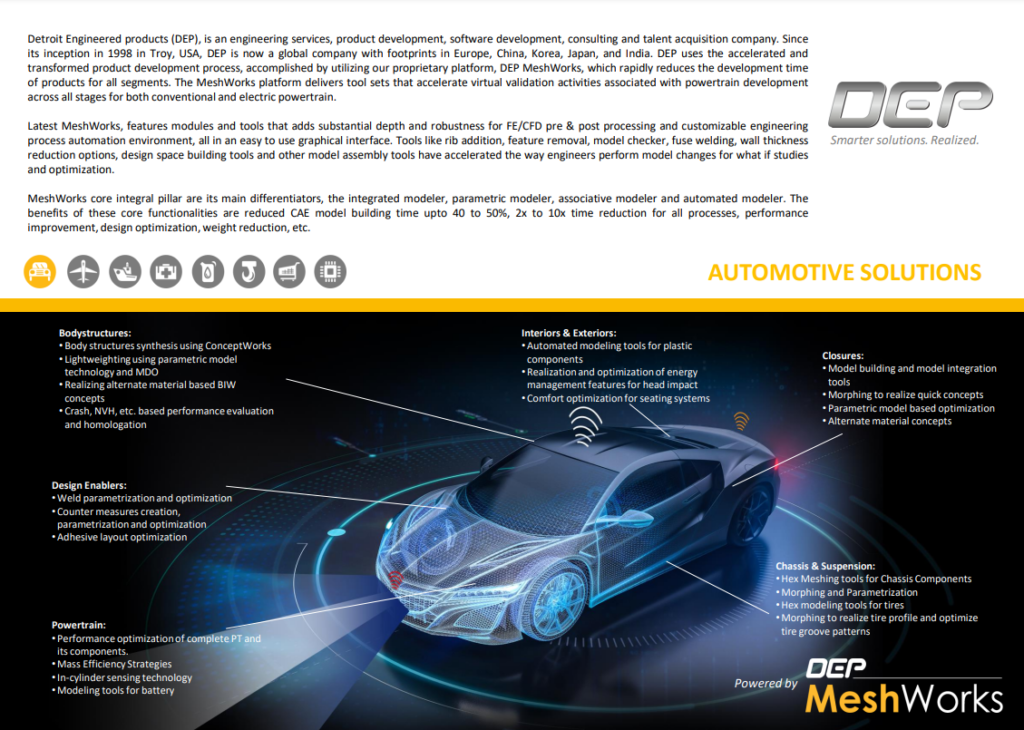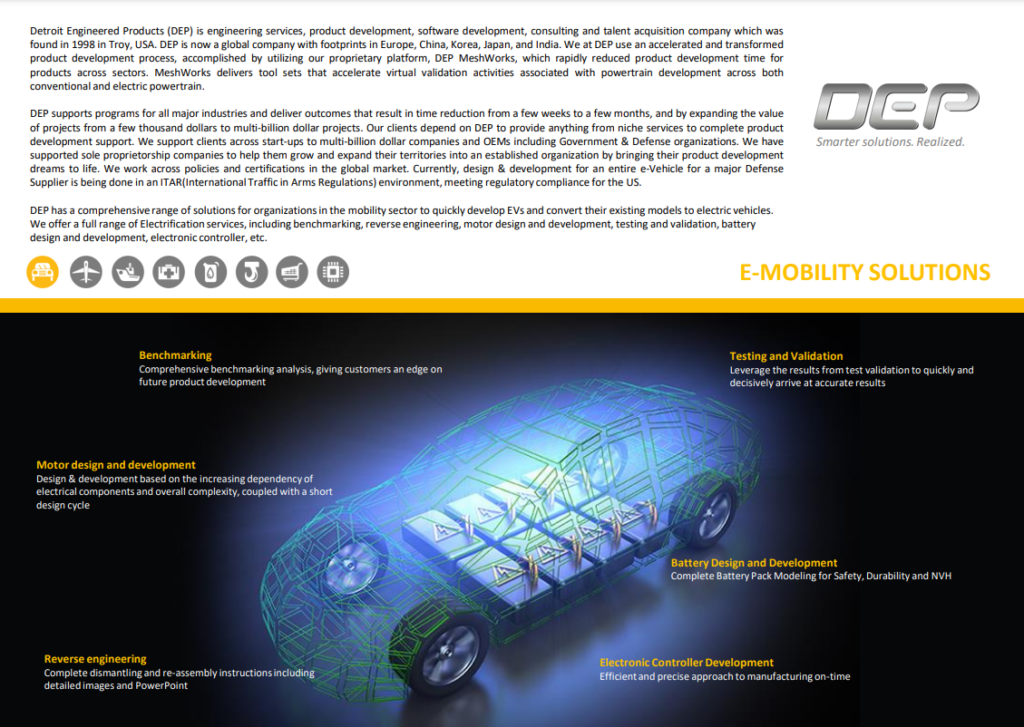
Model-Based Systems Engineering (MBSE) is transforming the automotive industry by enhancing the development of complex, interconnected vehicle systems. MBSE allows engineers to create digital models representing every aspect of the system’s lifecycle—from design and requirements to validation and deployment—enabling greater traceability, collaboration, and risk management. In an industry where advanced technologies like electric powertrains, autonomous driving, and connected vehicles are reshaping the landscape, MBSE helps manage complexity by integrating mechanical, electrical, and software components in a unified framework, reducing errors, and accelerating time-to-market.
DEP’s Approach to the Rise of Model-Based Systems Engineering (MBSE)
At Detroit Engineered Products (DEP), we recognize that automotive, aerospace, and defence manufacturers are increasingly adopting Model-Based Systems Engineering (MBSE) to streamline product development and enhance product features. DEP’s expertise in MBSE supports manufacturers by implementing a robust digital backbone that enables interconnectivity throughout the entire product development lifecycle. This approach extends beyond initial production, continuous updates, and product evolution. The integration of MBSE allows us to provide our clients with the ability to implement new features, such as over-the-air software updates, reducing the need for costly hardware changes and recalls.
DEP’s MBSE Solutions Empowering Manufacturers: As chips become more powerful and fewer are required, DEP helps manufacturers gain more control over product functionality by separating product logic from its software. With DEP’s MBSE solutions, manufacturers can introduce additional features or capabilities by updating the software model, improving efficiency, and reducing operational costs. For instance, a field issue can now be resolved through a software update, eliminating the need for physical recalls or hardware modifications.
The Value of a Model-Based Enterprise with DEP
DEP’s model-based enterprise (MBE) solutions provide a powerful framework for organizations to move beyond traditional, document-centric processes to a more integrated, digital approach. By transitioning to an MBSE, companies can streamline product development, eliminate data silos, and improve collaboration across teams. Research indicates that over 85% of organizations are actively investing in initiatives to boost their model-based capabilities, reflecting the growing industry trend toward digital transformation.
DEP plays a critical role in this shift, utilizing advanced Model-Based Systems Engineering (MBSE) techniques to drive innovation and operational efficiency. With DEP’s MBE solutions, businesses can manage product complexity, reduce defects in design and manufacturing, and significantly enhance product quality and time-to-market. DEP’s expertise allows organizations to not only implement MBSE but also optimize it for their unique needs, ensuring a smoother transition and measurable performance improvements throughout the product lifecycle.
From concept to execution, DEP’s model-based approach integrates all aspects of engineering, enabling better decision-making, and traceability, and reducing costly errors. This comprehensive support ensures that organizations stay competitive in an increasingly complex and fast-paced market environment.
Future of Model-Based Systems Engineering (MBSE) in the Automotive Industry:
As the automotive industry evolves, the integration of Model-Based Systems Engineering (MBSE) is becoming essential for driving innovation and efficiency. Detroit Engineered Products (DEP) is at the forefront of this transformation, offering solutions that empower manufacturers to navigate the complexities of modern vehicle systems.
Improved Requirements Management:
Effective requirements management is crucial for successful automotive projects. DEP’s MBSE tools enable comprehensive capture, analysis, and tracing of requirements, ensuring a deep understanding of system interactions. This approach enhances compliance with regulatory standards and improves traceability across the development process.
Accelerated Design and Development Cycles:
DEP leverages advanced simulation and modeling techniques to streamline design processes. Our solutions allow engineers to test and validate concepts virtually, leading to faster iterations and reduced costs. This capability ultimately improves product quality and aligns with the rapid pace of industry advancements.
Digital Twin Technology:
Our digital twin technology revolutionizes automotive manufacturing by creating virtual replicas of physical systems. DEP’s solutions enable real-time monitoring of performance and predictive maintenance, enhancing reliability and optimizing resource allocation. This proactive approach contributes to an improved end-user experience.
Adaptability to Emerging Technologies:
With the rise of AI, machine learning, and IoT, DEP’s MBSE offerings provide a robust framework for integrating these technologies. Our solutions ensure that automotive systems remain agile and adaptable, allowing manufacturers to harness the benefits of future innovations while maintaining competitive advantages.
Sustainability and Efficiency:
At DEP, we recognize the automotive industry’s commitment to sustainability. Our MBSE solutions empower engineers to model and analyze energy consumption, emissions, and lifecycle impacts of vehicle designs. This insight enables informed decision-making that aligns with environmental goals while optimizing performance.
How DEP Enhances the Systems Engineering Approach:
At Detroit Engineered Products (DEP), we are at the forefront of transforming the mobility industry through an enhanced Systems Engineering Approach. By leveraging integrated Model-Based Systems Engineering (MBSE), we streamline development processes and tackle design challenges early on. Our advanced simulation tools allow us to predict and address performance issues before physical prototypes are created. By applying systems engineering principles throughout the entire product lifecycle and fostering cross-disciplinary collaboration, we ensure optimized solutions tailored to our clients’ needs. Staying agile and adapting to industry trends positions DEP as a leader in mobility innovation.
Core Technologies:
Electrification
DEP enhances vehicle efficiency with advanced motor controllers, battery management systems, onboard chargers, DCDC converters, vehicle control units, and HVAC systems.
Connected Solutions
DEP offers seamless connectivity with Central Gateway, Telematics Unit diagnostics, Keyless systems, V2X, Over-the-Air Updates, and Cluster & HMI interfaces.
Driver Assistance
DEP’s solutions include Automatic Emergency Braking, Adaptive Cruise Control, Driver Monitoring, Park Assist, Lane Departure Warning, and Collision Avoidance for enhanced safety.
Control Units
DEP’s control units optimize powertrain, lighting, suspension, and infotainment systems, ensuring peak vehicle performance and a superior driving experience.

MBSE Consulting:
DEP’s MBSE (Model-Based Systems Engineering) consulting services begin with a comprehensive understanding of your system requirements. We collaborate closely with clients to accurately capture their objectives and translate them into a model-driven process. Our approach streamlines system design, development, and validation, helping you meet your performance and efficiency targets. We pride ourselves on delivering results with precision and scalability.
Key Benefits of DEP’s MBSE Solutions for the Automotive Industry:
Seamless Cross-Disciplinary Collaboration: DEP’s MBSE approach promotes a cohesive development environment, aligning teams from systems engineering, design, and testing, ensuring that all departments work from a unified model, fostering better communication and coordination.
Accelerated Design Iterations: With virtual simulations and digital twins, DEP allows automotive manufacturers to test and validate system designs early in the development phase, enabling faster iterations and reducing dependency on physical prototypes.
End-to-End Requirement Traceability: DEP’s MBSE tools offer comprehensive traceability from initial design to implementation, ensuring that each system component meets regulatory and industry requirements, making it easier to manage compliance across the vehicle lifecycle.
Efficient Systems Integration: DEP’s solutions streamline the integration of increasingly complex automotive systems, such as electric drivetrains and advanced driver assistance systems (ADAS), improving overall vehicle performance and reliability.
Shorter Development Cycles: By enabling concurrent workflows and virtual verification, DEP’s MBSE approach cuts down development time, helping automotive manufacturers bring products to market faster without compromising quality.
Reduced Costs and Risk: DEP’s MBSE solutions help identify design issues early, minimizing late-stage changes, reducing the risk of costly rework, and optimizing resource allocation throughout the project.












